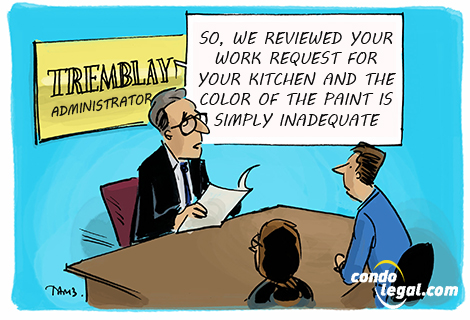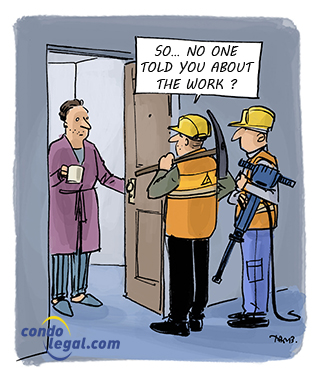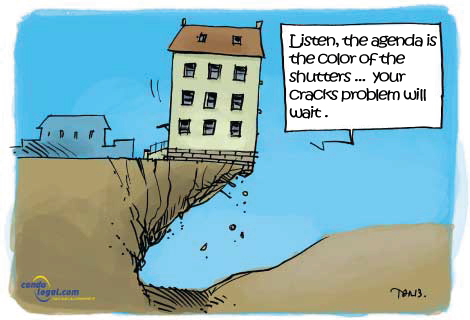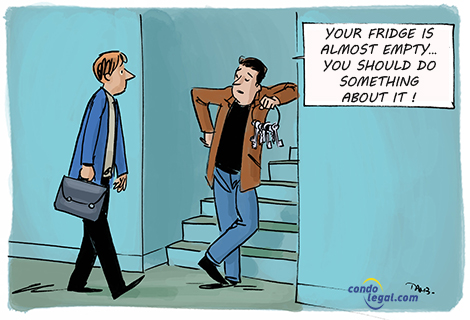27 Articles

In a co-ownership setting, certain renovations or modifications made by a co-owner may impact the common portions, necessitating specific procedures and approvals. When the work of a co-owner has an impact on the common portions, the latter must obtain authorization from the meeting of the co-owners to have it undertaken, even if the work is carried out in his private portion. This authorization requires a vote, the majority of which is greater than that required for the…...

Many co-owners mistakenly believe they have free rein when they want to relocate their kitchen, renovate electrical or plumbing installations, or demolish a wall in their residential unit. However, the by-laws of the immovable (declaration of co-ownership ) generally include strict guidelines, limitations, and even prohibitions concerning work that could be undertaken in a private portiob. This is why such work often requires prior approval from the board of directors. This decision-making body has the power…...

Many co-owners carry out work to renovate their apartments, after moving in, to make them more in tune with their tastes and personalities. Redecorating the premises and integrating new equipment,such as in the kitchen or the bathroom, is a legitimate endeavor. To know the rules to be respected, it is better to refer to the declaration of co-ownership. This is how you will have to check, before a project can begin, whether the work in…...

As in common portions, work can be carried out in common portions for restricted use, such as building a terrace upon which a co-owner would have exclusive use or transforming a balcony into an additional room attached to an apartment. If such cases, the co-owners must keep in mind that article 1063 of the Civil Code of Québec governs the use they can make of the common portions for restricted use. This article stipulates that:…...

The syndicate has the legal obligation to safeguard the immovable, concerning work in common and private portions. Such work includes minor or major repairs, and urgent interventions, when the conservation of the built-up patrimony is affected by a fortuitous event. In such occurrences, article 1066 of the Civil Code of Québec provides that no co-owner may interfere with carrying out, even inside his private portion work required for the preservation and which is necessary to…...
Lorsque la partie privative est louée et qu'il y a nécessité d'exécuter des travaux à l'intérieur de celle-ci, le syndicat doit donner au locataire les préavis prévus aux articles 1922 et 1931 du Code civil du Québec (C.c.Q.)....

Like any other natural or legal person, a syndicate of co-owners is susceptible to incur civil liability. This may be called into question during the execution of work in the common portions, as soon as a resident of the building or any other person in its environment experiences damage, direct or indirect. This can obviously be the co-owners and members of their family, but also all those who live there, tenants or occupants. The scope…...

Replacing windows, reroofing or rehabilitating underground parking slabs, to name but a few, is usually very expensive. Upgrading the common portions generally represents significant costs for the co-ownership and managing them can be complex. This reality is accentuated by the aging of Quebec's housing stock and the new obligations introduced by Bill 16. For this reason, the contingency fund study must set out the financial parameters that will make it possible to calculate the required…...

Section 7 of the Charter of human rights and freedoms guarantees the inviolability of a person's home. In principle, no one may have access to a co-owner's apartment without his or her consent; however, it has been rightfully ruled that this rule is not absolute and this is why most declarations of co-ownership specify that a co-owner, a lessee (tenant) or any other occupant of the immovable must leave at all times a duplicate set of keys to the board…...

The Asset Management Plan (AMP) is a comprehensive process for ensuring the conservation and maintenance of real property assets. This plan details the information regarding the common elements and the measures required to provide an agreed-upon level of service in the most cost-effective manner, while describing the associated risks. In particular, the AMP defines the intervention scenario to maintain the asset, quantifies the cost of its implementation and establishes the financing strategy, generally over a…...
